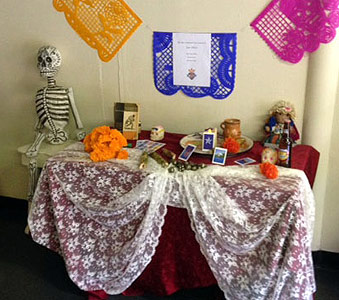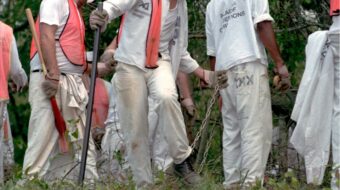
DALLAS – Like most places with large Latino populations, our town celebrates Dia de los Muertos (day of the dead) around Halloween. Teatro Dallas grouped three short plays with the title, “The Festival of Death” to run October 27-November 2.
The outstanding play was “The Ballad of Jane Elkins.” It’s mostly a soliloquy in which African-American slave Jane, already hanged for murder, comes back alive to go over her feelings in the last few days before she used an ax to split open the head of slave owner Master Wisdom. Jane Elkins holds the distinction of having been the first woman officially executed in Texas, but Texans are not particularly proud of their slavery history; consequently, few people know about Jane. In that regard, Teatro Dallas did a great service to the community here.
What little is known comes from the trial transcript. Jane was “worth” $700 and her owners had no objection to her being executed. She had been sold or loaned to Wisdom in 1853 ostensibly to care for his two children. He lived in Farmers Branch, a suburb that made a racist spectacle of itself in national news when they tried to fine any landlord who rented to undocumented workers. Jane was hanged in the center of Dallas in June 1853. According to the transcript, she did not speak during the trial and no one ever asked, “Why?”
The short play fills in the gaps. Actress Sydney Hewitt, with the rope still around her thin neck, tells us of a female slave’s life of humiliation and misery. “They broke my spirit long before they broke my neck,” she tells the audience. The final shame, of course, is rape. That’s what pushes her over the edge, as almost anybody who ever knew or thought about Jane Elkins believes.
The other two plays, “Cocaine” and “The Strange Rider” are also about death and dying. All three plays are well executed in the mode of Mexican surrealism that is familiar here.
A highlight of the performance comes in the theater lobby before any curtains open. Two walls hold small altars to our honored dead. Director Cora Cardona explains that Dia de los Muertos is the oldest tradition in the Western Hemisphere and predates the “discovery” by Columbus. She said that modern pressures have brought it into concurrency with European traditions of All Souls Day and Halloween. Mexican people, she said, have feasts in graveyards while remembering and honoring their deceased relatives.
One of the honored dead in Dallas this year is Thomas Eric Duncan, the first person to die of Ebola in America. Cardona said he was turned away from the hospital initially because he didn’t have health insurance. His altar has a figure in a hazmat suit and several hospital items arranged around a news article announcing his death.
Another altar has a book about slavery in America and several artifacts associated with slavery days in Texas. It honors Jane Elkins. For those who mourn slavery and the special oppression of women, the honor may be 161 years late, but it is very very welcome.
Photo: The altar dedicated to the memory of Jane Elkins, in the lobby of Teatro Dallas. Jim Lane/PW












Comments